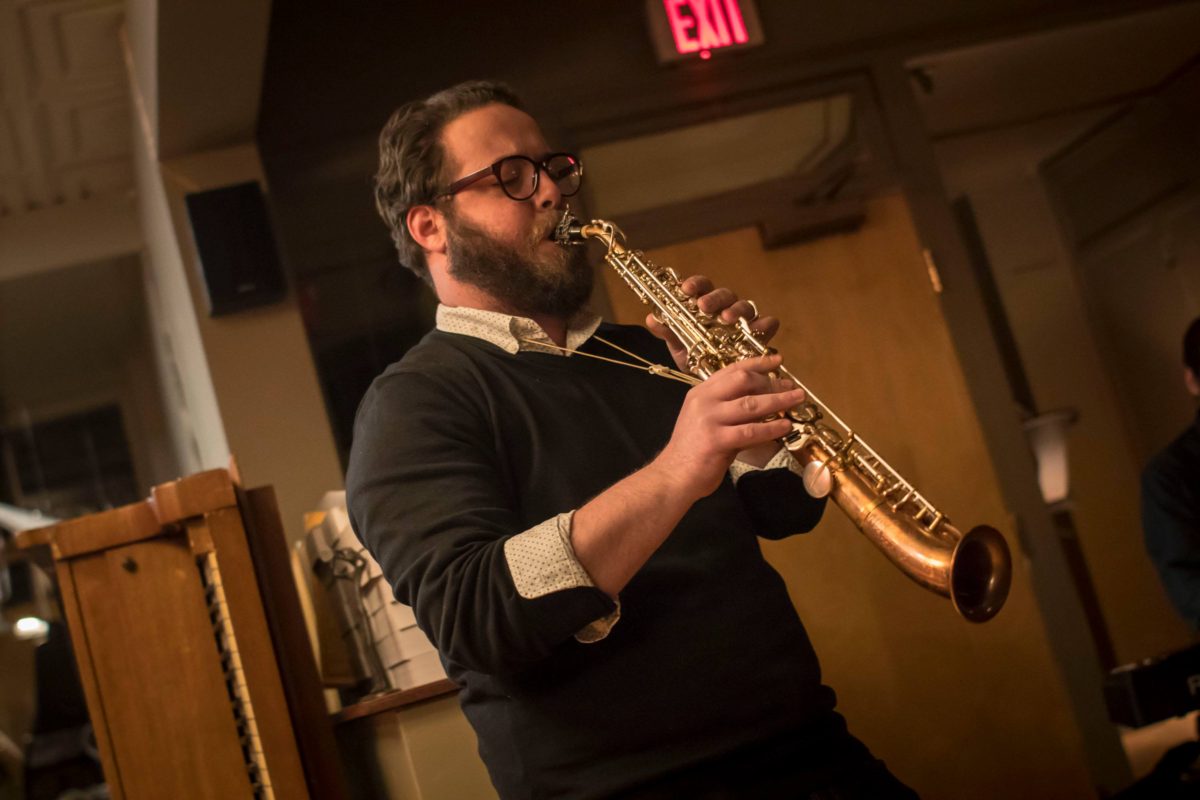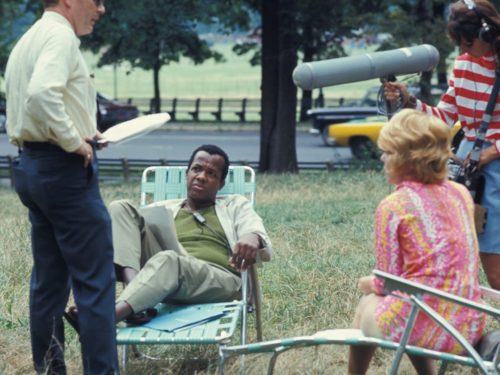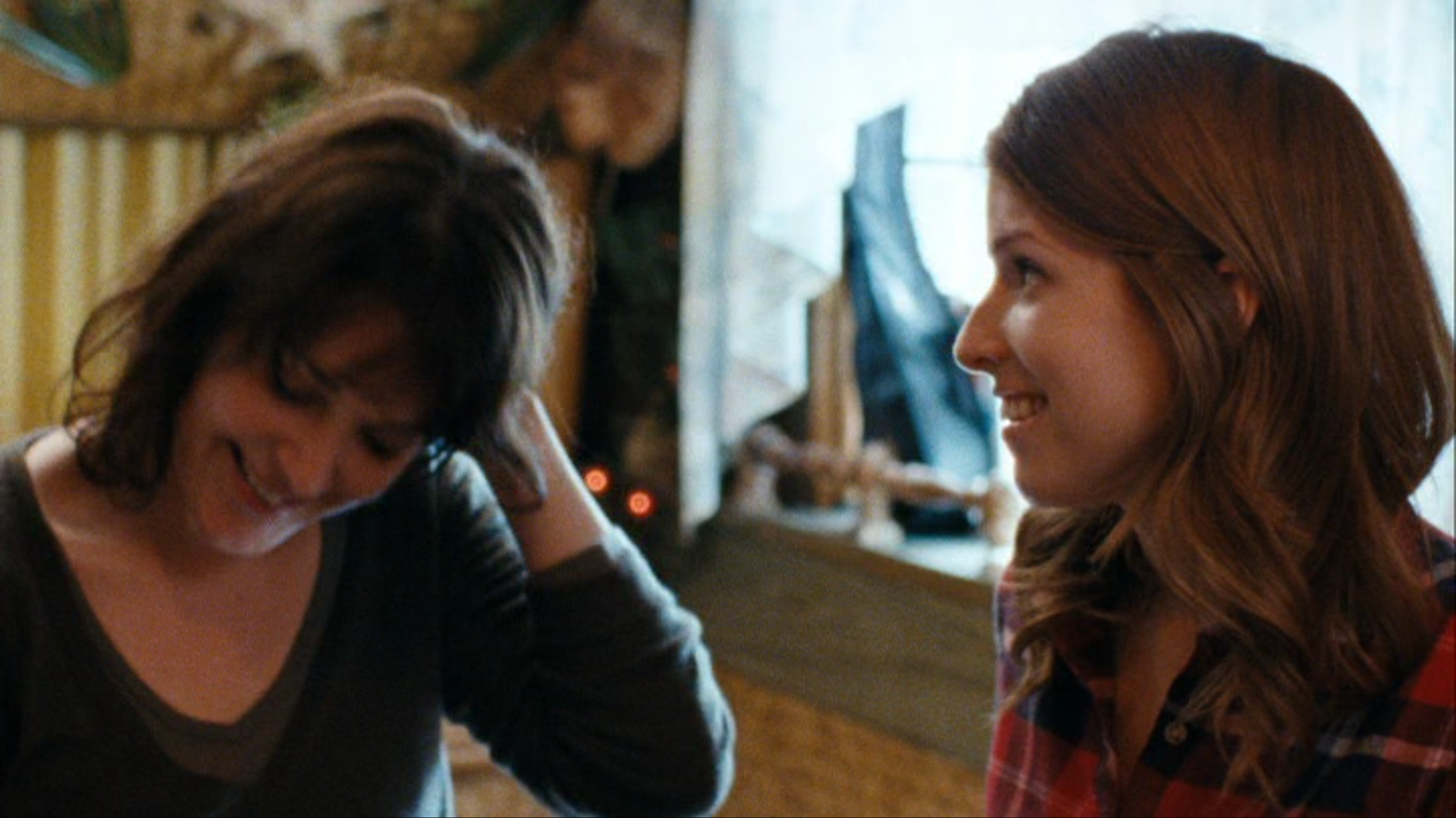As Boston jazzman Brett Walberg flings a barrage of tenor sax notes on the tail-end of an eight-hour studio session, he is divided in pieces. There’s his face, manic in expression but physically stoic in embouchure. His torso is wrapped in a black button-up which resembles a tarp bundled around hay as it struggles to stifle his chest hair. His legs move incongruently from the rest of him, disassociated from the work at hand, shuffling slightly like he’s at a middle school dance.
Walberg doesn’t exude grace. There’s little about him personally which commands the presence of the warehouse studio in South Boston. But his metal extension, his bionic arm of jazz, his tenor saxophone is anchoring the atmosphere — it commands his band and himself to stay and for everyone else to listen. It’s clear that Walberg is the sax, and the sax is Walberg.
That doesn’t mean they don’t need to take breaks from each other.
“Today is the last time I’m going to play for the next five days,” sighs Walberg with relief while the band packs up. “My face hurts so bad right now. It’s been a lot of playing. This whole year has been a lot of playing.”
“There’s nothing more humbling than not eating. You’re either starving or an artist.”
This long studio day is the culmination of a year’s worth of financial preparation and mental musing.
“I wasn’t sleeping very well, I was having all these really horrible dreams, and I said ‘OK, that’s kind of an interesting concept.’ A lot of the times you don’t remember the in betweens of dreams — I kind of remember the beginning, maybe remember the end, but there’s a gap,” says Walberg.
In Between Dreams is technically his 10th release, though he’d challenge you to track down more than two of his others. Dreams is slated for a summer release, the first of four albums that Walberg is hoping to put out this year. He describes it as “heady,” cerebral and heavy, carrying track titles like “Vivacious Simmer.”
“It’s all going to lead up to something uncomfortable — it’s not a happy ending. I’m kind of illustrating the path through it,” he says.
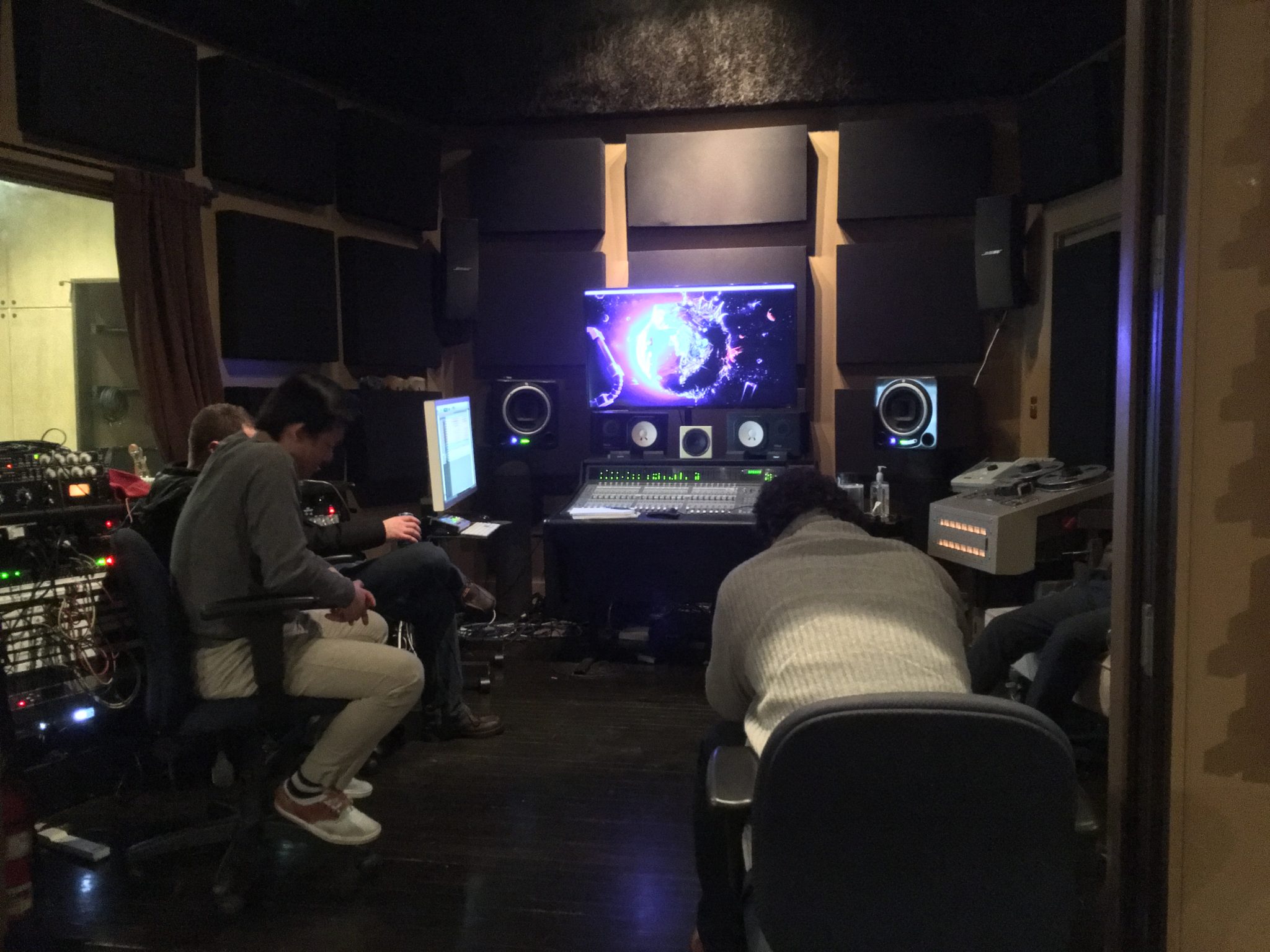
Walberg composed seven of the eight tracks on Dreams. Much of the inspiration comes from his own struggles, and a few years of being forced to decide which utilities to keep on certainly provided a few.
“The world doesn’t give a fuck if you’re good at your instrument. The world gives a fuck if you can pay rent and keep your lights on. And I wasn’t always successful at that,” he says, shaking his head at memories of dark apartments and light meals. “I was losing my mind. It was a soul suck. There’s nothing more humbling than not eating. … You’re either starving or an artist.”
But out of nightmares stem inspiration. And so, once Walberg was grocery shopping again, In Between Dreams was born, and a new iteration of his musicianship was too.
“You’re recording a specific moment in your life and career, and it is quantified in that moment: the use of eight tunes that I thought were best, in this moment in my life,” he says. ”I can always go back to it. It’s always there.”
Studio work often comes second for Walberg — to him, an album is more like a business card than a career culmination. His focus is on live performance, but with In Between Dreams, Walberg was able to find some middle ground.
“I wanted it to be captured in the same way people would listen to it if they had been in the studio or at the gig with us,” he says. “I wasn’t looking for a perfect record.”
Walberg has been performing live since he was 13. And, now 28, he’s settled in a bit. He’s comfortable with the musician he is and the gigs he can get. Ego is a young man’s game.
“No one wants to fight with an 18-year-old. All they have is time. It’s hard to compete with someone who has the time to do the bullshit street hustle that I don’t want to deal with,” he says. “The last thing I want to do is knock on people’s doors. Luckily, I don’t have to.”
After years trying to make a living doing what he loves, Walberg lives comfortably. He works 30 hours a week at Virtuosity, a music store, is an adjunct professor at Lasell College and has a live session every week on Tuesdays at Virtuosity, along with the scattered one-off show.
This smorgasbord of music work has not only put food on the table, but built Walberg a web of connections, which pay off in a fairly small Boston jazz community. Walberg had his band already in mind when he was ready to make another album.
“There’s a moment when you’re planning a record where you say ‘Who do I use?’” Walberg says. “I use the people that I trust. I use the people that may make the music sound better.” He gestures toward the studio’s kitchen, where his band members drink triumphant beers before heading their separate ways.
There’s Ben Melvin, the bassist who Walberg completed his masters with. There’s Miguel Landestoy, Walberg’s current roommate, manic on the keys. And there’s Jungho Kang, the percussionist who Walberg has known for nearly six years.
The niche nature of his genre gives a sense of camaraderie among those who practice it. It’s a welcome thing to be around like-minded musicians, Walberg says, particularly because it wasn’t always that way.
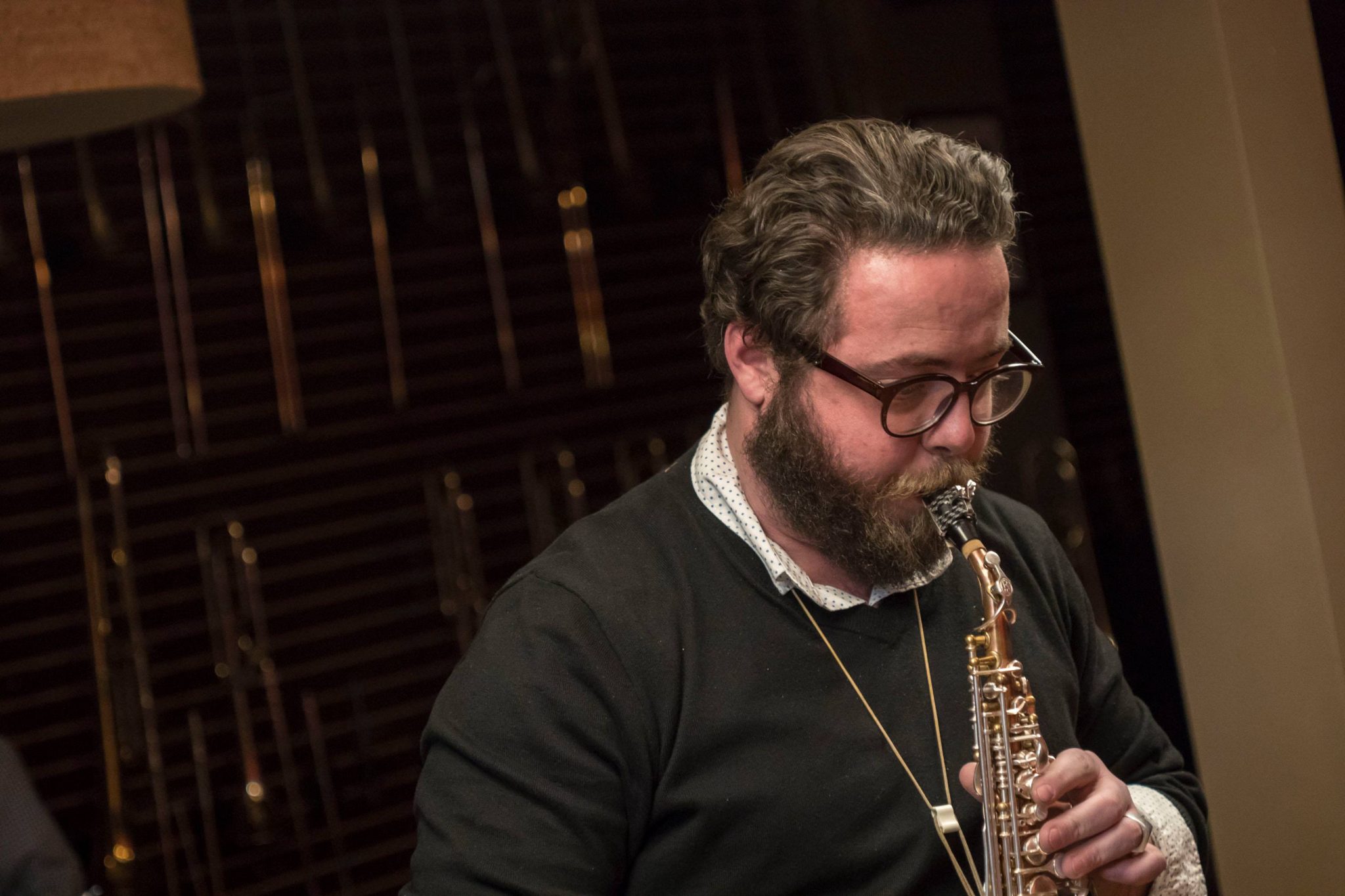
Walberg grew up in Blackstone, Massachusetts, in a family that was “firmly middle class.” Sometimes his sax fit in — with a high school band that often won competitions — but often Walberg felt like he didn’t.
“I’m the only musician in my family,” Walberg says, pulling off a coffee mug that gleams orange on the inside, indicating a preference for whiskey over caffeine as we approach midnight in the studio. “They were supportive to a point. They paid for stuff and gave me rides, but up until recently they thought I was crazy. I wanted to be a musician my whole life. You know like in kindergarten you do the thing? I said I wanted to be a musician. My teacher at the time said, ‘You can’t say that.’”
Walberg laughs, because he tried anyway. He ventured out, playing his way around the Northeast — New York, and now Boston. But, in a genre built on fierce traditionalism, Walberg is fighting an uphill battle anywhere he goes.
“I made a jazz record for those who are listening to things going on right now. But if you’re the type of person who just listens to jazz from the ’50s and ’60s, this is not the record for you,” he says. “I’m putting out a record that plays more to emotional content than to upholding the ivory pedestals of tradition.”
If you’re 28 and in Walberg’s shoes, this is all you can do — play what you feel and hope it pays off. For a musician just beginning to land on his feet, that freedom is its own realization of a dream.
“If I sell 10s of records I’ll be okay,” Walberg says. “I want it to be honest: bumps, bruises, blemishes, flaws. If they don’t want to listen for 30 minutes, listen to three minutes. If they want to switch it off, by all means. But the goal is to make them feel something.”
(Split Tooth may earn a commission from purchases made through affiliate links on our site.)

